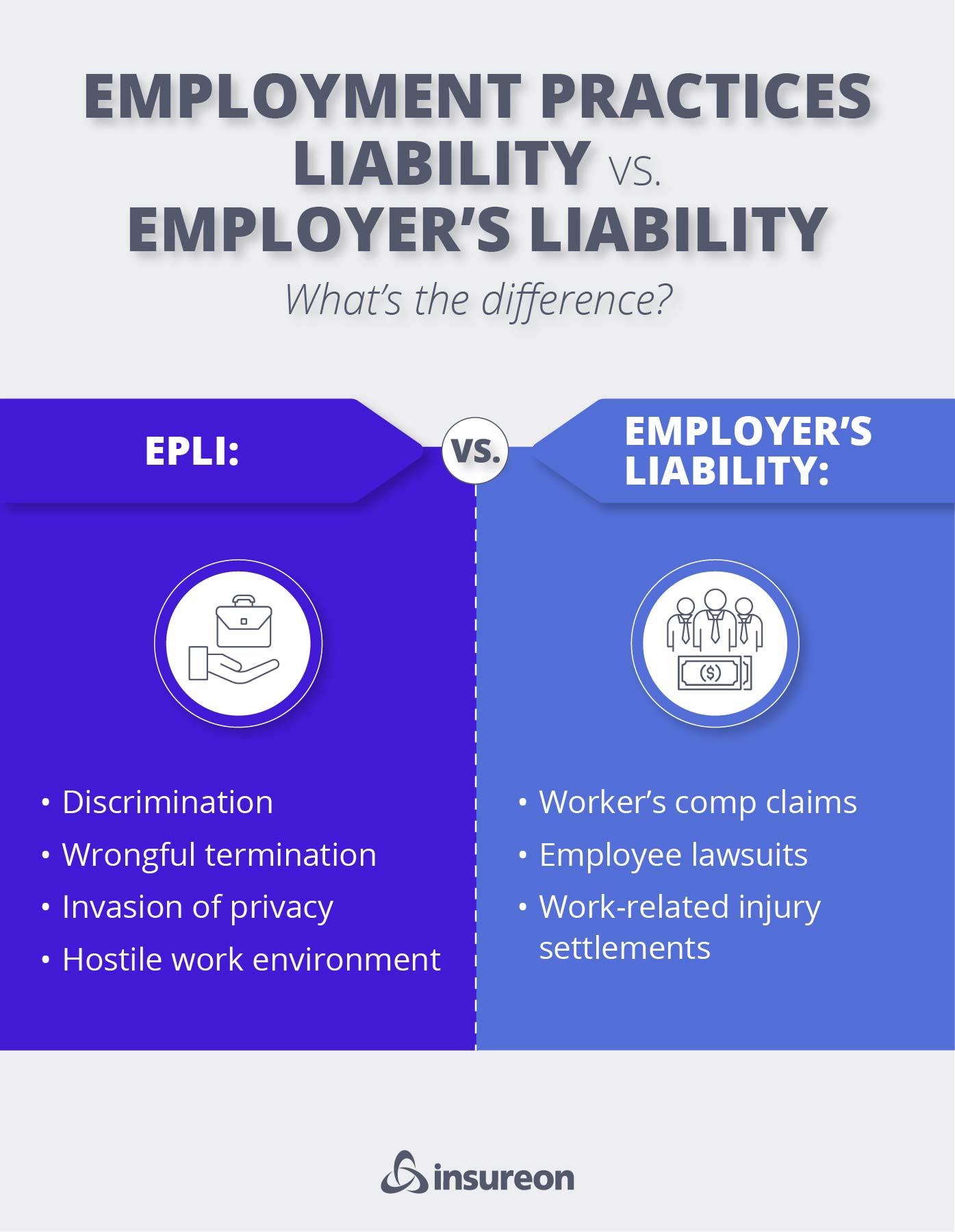
Employer's liability vs. employment practices liability insurance (EPLI)
What is employer's liability insurance?
Most businesses with employees are required by state law to carry workers' compensation insurance to protect their employees. Workers' comp provides financial assistance for medical expenses and lost wages if an employee suffers work-related injuries.
Small businesses with no employees, such as sole proprietors and independent contractors, often choose to carry this coverage even if it's not legally required because most private health insurance policies will not cover workplace injuries.
Employer's liability insurance protects businesses and small business owners from legal costs if an employee sues over work-related injuries. Employer's liability is often included in most workers' compensation policies.
If you live in a state where you can (or are required to) purchase workers' comp from a state fund, your policy will not include employer's liability insurance coverage.
You can purchase it separately as a standalone stop gap coverage policy, or as an endorsement to a general liability policy.
What is employment practices liability insurance (EPLI)?
Employment practices liability coverage (also called EPL insurance or simply EPLI) is a type of management liability insurance that provides legal defense for small business owners. This type of insurance specifically covers lawsuits related to employment issues.
These employment issues include:
- Defamation, such as slander and libel
- Wrongful termination claims
- Sexual harassment and emotional distress
- Employee benefits mismanagement
- Breach of contract
- Discrimination claims
If an employee claims they were mistreated and brings a lawsuit against your business, an employment practices liability insurance policy would help you pay legal expenses, court fees, judgments, punitive damages, settlements, and other financial losses.

What is the difference between employer's liability insurance vs. employment practices liability insurance?
Both policies help small business owners navigate expensive lawsuits related to employees, but they cover different things and are not interchangeable.
Employer's liability insurance covers workplace injury lawsuits. EPLI covers lawsuits related to workplace employment-related issues.
A major difference between these two policies is that employer's liability is often required for businesses that have employees as part of their workers' comp policy.
EPLI policies are generally not required by law regardless of the number of employees they employ, but are strongly encouraged for businesses with employees to protect against heavy financial losses from employee lawsuits.

Do you need both EPLI and employer's liability insurance?
Because these two policies cover different aspects of employment, both types of insurance are encouraged for small businesses with employees.
You can do your best to create a safe and inclusive work environment, but your employees may still feel bullied or mistreated and take you to court. EPLI would protect your business from these claims.
For example, a caregiver feels targeted by her colleagues and supervisor. She brings an employment-related claim against the company. However, because the agency is covered by EPLI, the legal defense costs are covered (besides the deductible).
On the other hand, you could do your best to practice risk management and maintain a safe work culture, but injuries can happen anywhere, making workers' compensation (and employer's liability) a must.
For example, a software engineer develops carpal tunnel and loses partial functionality in their hands. The injured employee sues their employer for not providing proper equipment. The employer has a state-funded workers' comp policy that covers the medical expenses, but does not have employer's liability. The company is required to cover its own legal costs.
Purchase the right workers' compensation and EPLI coverage to ensure your business is protected against the most common employment-related and workers' compensation claims.
Verified workers' compensation insurance reviews
Protect your business with the right insurance policies with Insureon
Get small business insurance by completing Insureon's easy online application. We'll provide free quotes from leading U.S. insurance companies.
Our licensed insurance agents can help you find the right liability coverage for your insurance needs and answer any questions you may have about premium pricing and insurance costs.
We can also help you find other small business options, such as general liability insurance.
Once you pick the perfect policies, we'll help you get a certificate of insurance, often within 24 hours.
